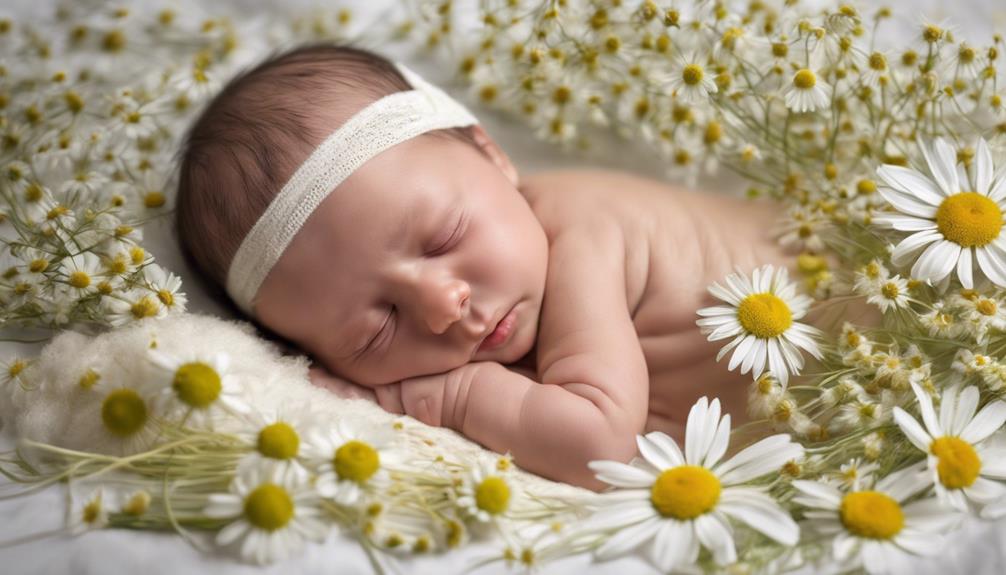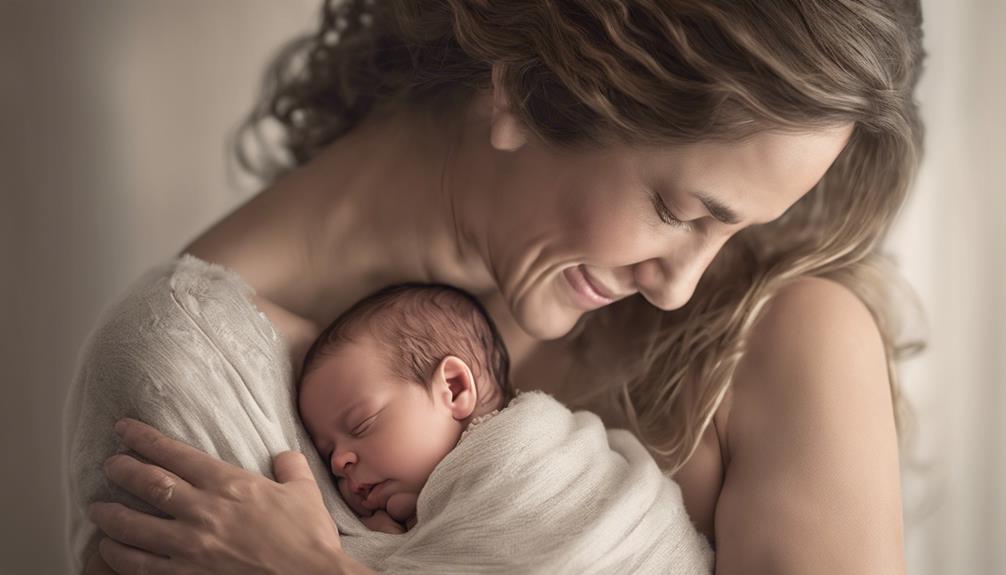When it comes to soothing your newborn's hiccups, you might find yourself overwhelmed by the various suggestions out there. However, amidst the sea of advice, how do you discern what truly works best for your little one?
Perhaps you've tried the classic remedies, but are curious about more unconventional methods. Stick around to uncover some unexpected yet effective ways to ease those tiny hiccups and bring peace to both you and your baby.
Key Takeaways
- Newborn hiccups stem from diaphragm irritation and developing nerve control.
- Effective remedies include burping, pacifiers, and creating a calm feeding environment.
- Natural remedies like gentle patting, burping, and gripe water drops can help.
- Seek medical advice if hiccups persist, cause pain, or interfere with daily activities.
Causes of Newborn Hiccups
Newborn hiccups are typically caused by the irritation of the diaphragm, resulting in the rapid closure of the vocal cords. In babies, the nerve control is still developing, making them more prone to these cute yet sometimes concerning hiccups. Premature babies, with their developing reflexes, are especially susceptible to these little episodes. Coordination issues in breathing and swallowing can also trigger hiccups in newborns. Surprisingly, hiccups in these tiny beings may actually play a role in healthy brain development.
Understanding the causes of baby hiccups can help you navigate this common occurrence with a bit more ease. While these hiccups are often harmless, they can be bothersome for both you and your little one. Knowing that hiccups may be linked to healthy brain development might provide some comfort. Stay tuned to discover soothing remedies to help alleviate these hiccups and support your baby's overall well-being.
Remedies for Newborn Hiccups

To help alleviate hiccups in your newborn, consider trying simple remedies like burping to release excess gas. Another effective method is using a pacifier, which can help relax the diaphragm and stop hiccups in newborns. It's common for hiccups to naturally subside within 5 to 10 minutes, so sometimes just giving it a little time is all that's needed. Avoid using gripe water for hiccups in newborns unless there is clinical evidence supporting its use. Additionally, creating a calm feeding environment can help prevent hiccups in your baby by reducing any potential triggers for hiccups.
| Remedies | Description |
|---|---|
| Burping | Helps release excess gas that may be causing hiccups in newborns. |
| Pacifier | Can relax the diaphragm and stop hiccups in babies. |
| Natural Wait | Allowing hiccups to naturally subside within 5 to 10 minutes. |
| Avoid Gripe Water | Not recommended for newborn hiccups without clinical evidence. |
| Calm Feeding Environment | Creating a peaceful setting during feedings can prevent hiccups in newborns. |
Natural Remedies for Newborn Hiccups

Consider gently patting your newborn's back after feeding to help release trapped air and alleviate hiccups naturally.
Burping your baby is a simple yet effective method to prevent hiccups caused by trapped air.
Offering a pacifier can help relax the diaphragm, potentially aiding in stopping those adorable but bothersome hiccups.
If recommended by your pediatrician, gripe water drops could be considered as a natural remedy to soothe your baby's hiccups.
Remember, allowing hiccups to naturally subside within 5 to 10 minutes is a common practice and is usually harmless.
Creating a calming environment during feeding times can also contribute to preventing newborn hiccups.
These natural remedies aim to provide comfort and relief to your little one while promoting a peaceful and hiccup-free experience.
Trust your instincts and try these gentle approaches to help your newborn navigate through hiccups with ease.
Prevention of Newborn Hiccups

To prevent newborn hiccups, make sure you feed your baby smaller, more frequent meals to reduce stomach bloating. By doing so, you can help minimize the air intake during feedings, which often leads to hiccups in newborns. Remember to burp your baby both during and after feedings to guarantee any trapped air is released and prevent hiccups from occurring.
Creating a calm and quiet environment during feeding times can also contribute to reducing the likelihood of hiccups in your baby. Overfeeding should be avoided as it can cause stomach distension, leading to increased chances of hiccups. Additionally, positioning your baby in an upright position after feedings can aid in digestion and help prevent hiccups.
When to Seek Medical Advice

If your newborn's hiccups persist for hours or cause them pain, it's important to contact a healthcare provider promptly. Seeking medical advice is critical when your baby's hiccups become a source of distress. Here are some signs that indicate it's time to consult a medical professional:
- If hiccups interfere with feeding, sleeping, or your baby's quality of life.
- When hiccups are accompanied by symptoms like vomiting or fever.
- If the hiccups are persistent and distress the baby or last for extended periods.
Consulting a healthcare provider can help determine the potential causes of these common hiccups. They can provide guidance on how to soothe your baby upright and offer assistance if the hiccups are affecting your little one's vocal cords or overall well-being. Remember, seeking medical advice promptly can help address any concerns and make sure your baby receives the necessary care.
Frequently Asked Questions
What Can I Give My Newborn to Stop Hiccups?
To stop hiccups in your newborn, try giving a pacifier or burping after feedings. Avoid water and consult a pediatrician before using gripe water. Let hiccups pass naturally in 5-10 minutes. It's safe and common practice.
What Position Is Best for Newborn Hiccups?
For newborn hiccups, the best position is upright on your shoulder or in a slightly inclined position on your lap or baby bouncer. Keeping their head elevated prevents discomfort. Gently pat or rub their back for relief.
Should I Lay My Newborn Down With Hiccups?
Lay your newborn down with hiccups; it's safe and won't harm them. Trust in the natural process as hiccups pass on their own. Keep an eye on their comfort, but rest assured, they can sleep peacefully.
How Do You Burp a Newborn That Won't Burp?
To burp a newborn that won't burp, try patting or rubbing their back in an upright position. Use different burping positions like over the shoulder. Give breaks during feeding to burp. If needed, burp before and after feeding to release trapped gas.
Conclusion
To sum up, when your precious newborn experiences hiccups, remember that gentle remedies and soothing techniques can bring relief.
By understanding the causes and utilizing natural remedies, you can ease your baby's discomfort with care and compassion.
If hiccups persist or cause concern, don't hesitate to seek medical advice.
With these effective strategies in your toolkit, you can confidently navigate this common yet manageable challenge in your little one's early days.









